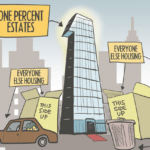Causes of Homelessness in America

Homelessness is a pressing issue in America, affecting a significant portion of the population. It is important to understand the causes behind this growing problem in order to effectively address it. Homelessness can be defined as the state of lacking a stable, safe, and secure place to live. There are various categories of homelessness, including individuals and families experiencing homelessness, unsheltered individuals, and people living in shelters or temporary housing.
The historical background of homelessness in America dates back to the pre-colonial and colonial periods when poverty and lack of resources were prevalent. Urbanization in the 20th century increased the rate of homelessness, and the 21st century continues to see high rates due to various factors.
Mental illness is a significant cause of homelessness, as many people with mental health issues struggle to maintain stable housing. Unemployment is another major contributing factor, as individuals without jobs often cannot afford housing or meet their basic needs. Additionally, the lack of affordable housing has led to a rise in homelessness, as housing costs continue to surpass the income of many households.
 Other causes of homelessness include substance abuse, poverty, inadequate legal systems, and cultural and social factors. Substance abuse can lead to unstable living situations, and poverty creates a cycle of homelessness for many individuals. Inadequate legal systems fail to provide the necessary support and aid to prevent homelessness, and cultural and social factors marginalize certain groups, making them more susceptible to homelessness.
Other causes of homelessness include substance abuse, poverty, inadequate legal systems, and cultural and social factors. Substance abuse can lead to unstable living situations, and poverty creates a cycle of homelessness for many individuals. Inadequate legal systems fail to provide the necessary support and aid to prevent homelessness, and cultural and social factors marginalize certain groups, making them more susceptible to homelessness.
Efforts towards ending homelessness involve various initiatives, such as housing programs and employment programs. Providing affordable housing and supportive services is crucial in helping people experiencing homelessness regain stability and independence. Government support, both at the federal and state levels, is essential in implementing effective solutions to address the root causes of homelessness.
The effects of homelessness are far-reaching, impacting both physical and mental health. Homeless individuals often lack access to healthcare services, leading to a decline in their overall well-being. There is also a social stigma associated with homelessness that further isolates and marginalizes homeless people from society. Lack of access to education and resources further perpetuates the cycle of homelessness, making it difficult for individuals to escape this challenging situation.
The state of homelessness in America presents both challenges and opportunities. While the rates of homelessness continue to be high, there is growing awareness and support from organizations and advocacy groups working towards ending homelessness. However, the lack of affordable housing remains a significant barrier to progress.
Statistics and demographics provide valuable insights into the scope and scale of homelessness in America. The Annual Homeless Assessment Report to Congress is an important resource that tracks and analyzes data related to homelessness. Other statistics paint a clear picture of the current state of homelessness and highlight the urgent need for effective solutions.
In conclusion, homelessness in America is a complex issue with multiple causes. Addressing the root causes and implementing effective strategies is crucial in reducing and ultimately ending homelessness. By providing affordable housing, employment opportunities, and supportive services, society can help individuals and families experiencing homelessness regain stability and improve their quality of life.











